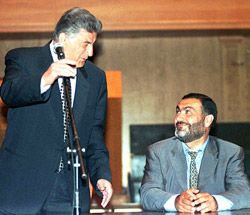Beginning in seven previous editions
The appearance of Karen Demirchyan in the political arena was interpreted differently. Some claimed that Vazgen Sargsyan invited Demirchyan, thinking that Kocharyan would get rid of him after occupying the position of president. Others said that Demirchyan was “uplifted” by the Russian elite which included most of his former colleagues. Some simply interpreted that step taken by the former head of the Communist Party as a human weakness, ambition, taking into consideration that the Communist heads of his generation-Aliev and Shevardnadze-were presiding over their countries just like before.
At the time I couldn’t decide which of the abovementioned views was correct. I was more inclined toward the version of Vazgen Sargsyan inviting him, especially after the union of the “Republican” party (supported by Sargsyan) and the Armenian Popular Party founded by Karen Demirchyan a year later. Now I don’t believe in that either, and think that the appearance of Demirchyan in the political arena of newly independent Armenia was simply a natural calamity which couldn’t have not taken place.
Armenian society had not fully grasped the concept of the resignation of Ter-Petrosyan as a strong political action. People didn’t understand that resignation, and not just any resignation but the resignation from the post of president, was a gauntlet thrown at society, the units of the political system, the mass media and why not, even the international community. It was a gauntlet which nobody was able to overcome; a gauntlet which was impossible to overlook. For that it was necessary to have a huge, thick and black curtain. That curtain could no longer be the political struggle of Vazgen Manukyan, Arshak Sadoyan’s populism, and Shavarsh Kocharyan’s capabilities of analyzing. Each time the people met them they would remember the gauntlet thrown by Ter-Petrosyan.
That curtain could no longer be the political struggle of the standardized Communists because they had already lost two times and, in their miserable condition, were going to remind people of the gauntlet thrown by the first president. The Dashnaks were not capable of using this curtain for the same reason. In addition to this, the latter had been buckled down to Robert Kocharyan’s campaign with the “service in exchange for liberty” format.
The so-called curtain was going to be a dividing line, and there wouldn’t be this or that people on one side, but rather an entire timeslot. It was enough to have Karen Demirchyan make speeches on television and congratulate Armenian women on March 8th to make that “Sovietized” international holiday be brought back as a day for celebration and marked with a red color on the calendar. True, this is a minor detail, but it proves two things: how elemental power is and how there is a need for the curtain.
Was this element profitable for Robert Kocharyan, who was preparing to become president and was de facto representing the victorious soldiers? Of course it was profitable. The gauntlet thrown by Ter-Petrosyan was first of all aimed towards the victorious soldiers. The elemental curtaining gave Kocharyan the opportunity to avoid (not at that moment but later) debates on the theme “War or Peace”, not to get into that and not to show the failure of the opposite viewpoint. The elemental curtaining was also liberating Kocharyan from the remainders of the politics of Ter-Petrosyan’s era. The crowds that were crazily butchering sheep in Demirchyan’s honor were cleaning up everything from the time of Ter-Petrosyan and even cleaned up back to the year 1990 when the Communists “reasonably” ceded power. As the crowds got there, they fell into an abyss, gathered there and enjoyed the free fall. That was the same abyss that Karen Demirchyan was talking about when he said that they have to take the people out of the abyss. In essence, he was talking without having a plan; in essence, he didn’t have a vision of how and with what he was going to fill up the empty space of time.
The only visible force in idle was the victorious soldiers that had not surrendered to torments because it saw how the selfless crowds were clearing everything, including all the effort they had put in and their successes. And that force, which Robert Kocharyan had already leaned on, had become something like an emergency situation reaction squad. The well-known defenders of the fatherland used to say, “We weren’t going to let Demirchyan pass, were we?” with so much certainty that you began to suspect even the meaning of the elections.
On March 31, 1998, Robert Kocharyan became president of the Republic of Armenia. Levon Ter-Petrosyan was present during the ceremonies, and this surprised many, but there was nothing to be surprised about. Ter-Petrosyan had handed the power down to Kocharyan and not to the elements, and the day had come to remind him that there is a time-dividing gauntlet behind the huge, thick and black curtain that has not been raised.
To be continued…

